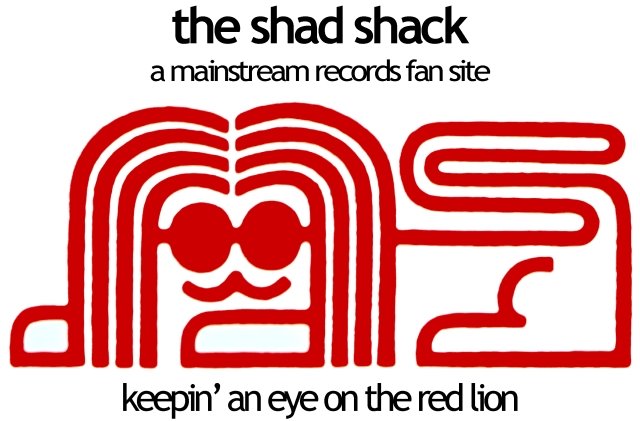

MRL 349
1972
Personnel:
Saxophone [Tenor, Alto, Soprano], Clarinet [Alto] - Frank Foster
Bass - Gene Perla, Stan Clarke
Drums - Omar Clay , Richard Pratt
Drums, Percussion - Elvin Jones
Engineer - Carmine Rubino
Guitar - Earl Dunbar
Percussion - Airto Moreira
Piano, Electric Piano - Harold Mabern, Jan Hammer
Saxophone [Alto, Baritone], Clarinet [Bass] - Kenny Rodgers
Trombone - Dick Griffin
Trumpet - Hannibal Marvin Peterson
Trumpet, Flugelhorn - Cecil Bridgewater, Charles McGee
Vocals - Dee Dee Bridgewater
Tracks:
A1 I Keep It Hid (3:27)
A2 Looking At Life (3:10)
A3 Don't Worry Why (3:22)
A4 Maybe This Time (3:18)
A5 Never Did I Stop Loving You (2:34)
B1 Charms Of The Arms Of Love (2:38)
B2 Don't You Care (2:49)
B3 It Takes Too Long To Learn To Live Alone (3:34)
B4 Hard Hard Promises (3:05)
B5 Hey Girl (3:16)
1972
Personnel:
Saxophone [Tenor, Alto, Soprano], Clarinet [Alto] - Frank Foster
Bass - Gene Perla, Stan Clarke
Drums - Omar Clay , Richard Pratt
Drums, Percussion - Elvin Jones
Engineer - Carmine Rubino
Guitar - Earl Dunbar
Percussion - Airto Moreira
Piano, Electric Piano - Harold Mabern, Jan Hammer
Saxophone [Alto, Baritone], Clarinet [Bass] - Kenny Rodgers
Trombone - Dick Griffin
Trumpet - Hannibal Marvin Peterson
Trumpet, Flugelhorn - Cecil Bridgewater, Charles McGee
Vocals - Dee Dee Bridgewater
Tracks:
A1 I Keep It Hid (3:27)
A2 Looking At Life (3:10)
A3 Don't Worry Why (3:22)
A4 Maybe This Time (3:18)
A5 Never Did I Stop Loving You (2:34)
B1 Charms Of The Arms Of Love (2:38)
B2 Don't You Care (2:49)
B3 It Takes Too Long To Learn To Live Alone (3:34)
B4 Hard Hard Promises (3:05)
B5 Hey Girl (3:16)
Producer - Bob Shad
Liner Notes - Leonard Feather
Cover Design - Maurer Productions
Photography - Raymond Ross
AMG Review
by Michael G. Nastos
The early '70s were rife with political and racial conflicts, indicative of the pressures surrounding the scandal of Watergate and Richard Nixon, the assassination of Martin Luther King, Jr., and the painful continuation of the Vietnam War. As explosive as the times were, Frank Foster's The Loud Minority reflected all of those mounting tensions while remaining hopeful in a self-determining way that gave rise to the "I'm Black and I'm Proud" sentiment. Foster assembled a giant of a big band featuring dual instrumentation all around, including keyboards, basses, and drummers to power a horn section chock-full of the best mainstream jazz and progressive players of the day. Because funk-fusion was flowering, electrified elements of guitar and Fender Rhodes piano identify the music with the times, while vocalist Dee Dee Bridgewater, never known as a protest singer, reads powerful poetry and screams freedom at the top of her lungs, inspired by a band that knows no bounds or limits, at its core a mighty modern jazz orchestra removed from Foster's work with the Count Basie band. "J.P's Thing" provides the ultimate in memorable melodic invention, vibrant layers of call and response, and the kind of shout-out energy every jazz fan craves. It's a driving, funky number, very much representative of the time period, full of hope and spirit, with low-end bass clarinets firing off the rest of the horns -- a great track! "Requiem for Dusty" is for a late, favored German Shepherd, a sad ballad with Foster on his rarely played alto sax and Stanley Clarke's arco acoustic bass solo with drama confined to smaller spaces, almost Greek epic, elegiac for sure. New York DJ Ed Williams is paid tribute to in "E.W. -- Beautiful People," a free and light Latin piece with Foster's soprano sax wailing in a darkly dramatic hue, with fine solos from acoustic pianist Harold Mabern and trumpeter Charles McGee. The title track is a composition with Bridgewater identifying icons of change and liberation from oppression, with statements that the Loud Minority is not a nonprofit, and the profit is in the victory "as opposed to you know whooooooooo." A united front of furious funk and churning rhythms via Airto, Elvin Jones, Richard Pratt, and Omar Clay with the Rhodes of Jan Hammer and electric guitar of Earl Dunbar under Foster's spirited horn chart makes this one leap out of the speakers. Notable soloists include trumpeters Marvin "Hannibal" Peterson and Cecil Bridgewater, baritone saxophonist and bass clarinetist Kenny Rogers, and trombonist Dick Griffin. A different, less virulent edition of the Loud Minority came down the pike several years later, but this was the first and clearly the loudest, and not minor by any stretch of the imagination.
Dusty Groove review:
One of the most amazing albums ever from Frank Foster -- a totally righteous set that's light years ahead of his earlier work with the Basie Band! The format here is right up there with the best on Strata East at the time -- a large-group session that's filled with some of the hippest players of the early 70s -- all coming together with a joyous, spiritual sense of power! Foster's in the lead on tenor and soprano sax, but other players include Cecil Bridgewater and Hannibal Marvin Peterson on trumpets, Harold Mabern on keyboards, Elvin Jones on drums, Dick Griffin on trombone, Stanley Clarke on bass, Airto on percussion, and even Dee Dee Bridgewater on vocals! Tracks are all quite long and flowing -- spiritual expressions of jazz that rival the greatness of anything recorded for Impules -- and titles include "The Loud Minority", "Requiem For Dusty", "JP's Thing", and "EW -- Beautiful People".






4 comments:
http://pharaohs-dance.blogspot.com/2006/11/frank-foster-loud-minority-1972-line.html
http://clubdub.blogspot.com/2007/08/frank-foster-loud-minority-1971.html
Thanks for this. I had the LP in high school, back when I too was playing alto clarinet. It's great to hear it again.
Confusion in the track list.
Here's the actual one:
Tracklist
1 The Loud Minority 14:30
2 Requiem For Dusty 6:09
3 J.P.'s Thing 11:41
4 E.W. - Beautiful People 8:47
Cheers
Post a Comment